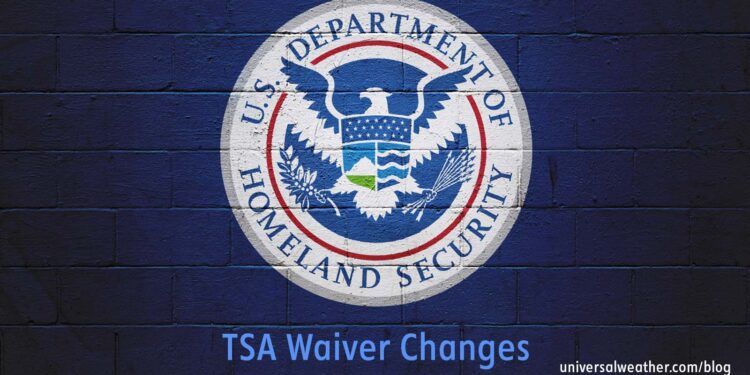Business Aviation Alert: TSA Waiver Changes Now in Effect

The Federal Aviation Administration (FAA) in coordination with the Transportation Safety Administration (TSA) recently issued changes to TSA waiver requirements. As these changes go into effect immediately, it’s important for general aviation (GA) operators to be aware of applicable regulatory revisions. It’s been several years since changes were last made to TSA waiver requirements. These recently inaugurated changes seem to be a result of the governing authorities having determined that Advanced Passenger Information System (APIS) and other aviation security programs have made certain TSA requirements redundant.
The following is an overview of what you need to know:
1. Recent changes
Three NOTAMs were issued December 11, 2015 – 5/6289, 5/5806 and 5/5782 – to make immediate changes to existing TSA waiver requirements. These changes, which had not been announced in advanced, generally impact GA favorably. TSA waivers will now no longer be needed for many operators who formerly had to have them.
2. TSA waiver requirements
The following are the current TSA waiver requirements:
- Foreign-registered aircraft under 100,309 lbs. maximum takeoff weight (MTOW) operating within the U.S. and its territories and possessions no longer require TSA waivers, with the exception of aircraft registered in special interest countries – China, Cuba, Iran, North Korea, Russia, Sudan and Syria
- Aircraft overflying the U.S. and its territories and possessions, except U.S.-registered aircraft under 100,309 lbs. MTOW, still require waivers
- Aircraft registered in special interest countries need TSA waivers to operate within and overflying the U.S. and its territories and possessions. In addition, they also require Special Routing Authorization from the FAA.
- Foreign-registered aircraft conducting maintenance, production test, demo or delivery flights may or may not require waivers under the new regulations
3. Maintenance, delivery and demo flights
In the past, all foreign-registered aircraft flying to the U.S. for maintenance, delivery, or demo flights had to have a TSA waiver and comply with requirements to:
- have a U.S. company in operational control of the aircraft
- have a FAA certified pilot as the pilot in command (PIC)
- have only crewmembers, no passengers, onboard
- note “maintenance flight” in remarks section 18 of the ICAO flight plan
As a result of the recent changes only foreign-registered aircraft over 100,309 lbs. MTOW require TSA waivers for maintenance flights. Aircraft less than 100,309 lbs. MTOW, meeting the above requirements, no longer need TSA waivers. Note that if the flight operation does not meet all the above mandates, TSA waivers will be required.
4. Good news for foreign-registered operators
In the past, the only exemption for foreign-registered aircraft not needing a TSA waiver had been for aircraft registered in specific portal countries – Bahamas, Bermuda, British Virgin Islands, Canada, Cayman Islands and Mexico – and for aircraft flying APIS-controlled flight legs (such as Stansted (EGSS)–White Plains (KHPN)-EGGS). Today, while U.S. and foreign-registered aircraft over 100,309 lbs. MTOW still require a TSA waiver when overflying the U.S., foreign-registered aircraft under 100,309 lbs. MTOW are exempt from TSA waiver requirements when operating to, from, and within the U.S. and its territories and possessions.
5. Overflight waivers
U.S.-registered aircraft over 100,309 lbs. MTOW overflying the U.S., as well as all foreign-registered aircraft irrespective of MTOW, require TSA waivers. This requirement exists even if you’re in the U.S. airspace or its territories and possessions for only a few minutes. It’s important, therefore, to be cognizant of your city pairs and routings to ensure that waivers are obtained when required.
6. U.S. territories and possessions
Airspace covered under TSA waiver overflight mandates includes:
- American Samoa
- Guam
- Northern Mariana Islands
- Puerto Rico
- U.S. Virgin Islands
- Palmyra Atoll (Pacific)
- Baker Island (Pacific)
- Howland Island (Pacific)
- Jarvis Island (Pacific)
- Johnston Atoll (Pacific)
- Kingman Reef (Pacific)
- Wake Island (Pacific)
- Midway Island (Pacific)
- Navassa Island (Caribbean)
- Serranilla Bank (Caribbean)
- Bajo Nuevo Bank (Caribbean)
- Continental U.S., Alaska, Hawaii
7. FAA special routing authority
Note that mandates for FAA special routing authority are unaffected and unchanged by recent TSA revisions. Special routing requirements only apply to “special interest countries” of China, Cuba, Iran, North Korea, Russia, Sudan and Syria, and there have been no changes to these requirements. Special routing authority along with a TSA waiver is required for covered operators when traveling through the U.S. airspace and its territories or possessions. Note that the covered airspace extends 12 nautical miles (NM) out from U.S. land area, as determined in accordance with international law.
8. Permits to proceed and border overflight exemptions
The requirement to have a Permit to Proceed – which is providing a gendec to U.S. Customs for review and approval for each leg within the U.S. – remains in place for foreign-registered charter flights and is independent of TSA waiver requirements. Likewise, mandates for Border Overflight Exemptions (BOEs) and Visa Waiver Programs are also independent of TSA waiver requirements.
Conclusion
Changes to TSA waiver requirements are a welcomed change for many operators who’d formerly required waivers. One of the benefits of the APIS program has been reduced need for certain redundant vetting programs and processes such as TSA waivers. Looking to the future, it’s conceivable that all TSA waiver requirements may one day be phased out.
Questions?
If you have any questions about this article or would like assistance obtaining your next TSA waiver, contact Juan Muniz at juanmuniz@univ-wea.com.




